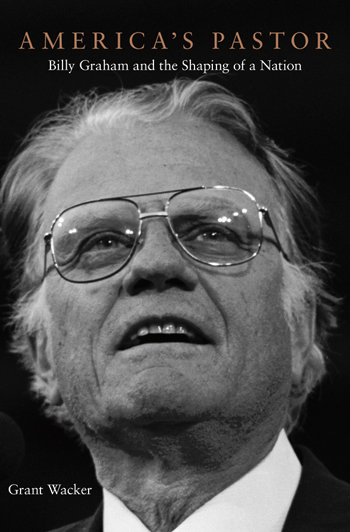Ruth McCue Bell, born in 1920 to Southern Presbyterian missionary parents in east central China, came to Wheaton College near Chicago in 1937. Planning to dedicate her life to missionizing Tibetan nomads, she did not quite know what to do when she found herself attracted to a tall fellow student from North Carolina who already had a growing reputation as a preacher.
He demanded an exclusive relationship, while she hardly understood the intricacies of American dating etiquette. She did understand somehow that he was the one for her, if she could renounce her foreign missionary ambitions and become an evangelist’s wife. If she did so, he insisted, everything would work out, because he was sure that God had brought them together.
Of course, this young man was Billy Graham. Ruth did decide to join him. They married in August 1943 and had a long life together until her death in 2007. Despite her husband’s renown, the story of her life on its own terms is not well-known.
Ruth Beth Graham lived out a deeply personal Christian commitment. Moreover, “Mrs. Billy Graham” affected her husband profoundly, as his closest companion but also the most steadfast supporter of his public work; she filled the “officially unofficial” role of clergy wife.
Throughout U.S. religious history, the public story we have known about “the minister’s wife” as helpmeet has overshadowed the equally important, more idiosyncratic story of these women’s own faith lives. To get to know Ruth on this level is to understand better the generations of clergy wives who preceded her, and the part she played in negotiating the role of clergy wife at a pivotal moment for both women and religion in U.S. life.
Ministers’ wives have for centuries worked alongside their husbands without pay or official acknowledgment, hewing to historically static congregational expectations that they be dedicated wholly to the husband’s work. A pastor’s wife must serve cheerfully with him, exemplifying a deep Christian devotion and what Catherine Lyman Adams in 1835 called “practical godliness” -- following the pious, pure, domestic and submissive pattern of “true womanhood” that historian Barbara Welter identified almost 50 years ago.
While this model loosened its hold with the coming of second-wave feminism, expectations for clergy wives have remained curiously static and consistently isolating. The pastor’s wife must be frugal but not frumpy, likable without seeming to play favorites, capable without presuming on her own authority. In all, she should promote her husband’s work as the primary expression of her allegiance to God and the growth of God’s kingdom.
Yet a clergy wife also knows that she is God’s beloved child before she is the pastor’s beloved wife.
Ruth Bell Graham clung to this truth and used writing as a shelter in which to explore it. She wrote 11 books, many of them works of poetry. In her poetry, she could explore her bedrock relationship with God.
She certainly sacrificed, worked and prayed for the success of Billy’s evangelistic crusades. She counseled new Christians. She supplied Billy with sermon illustrations from her constant reading. In addition to giving up her missionary dreams, she surrendered an ordinary life with her husband and shouldered, often by herself, the burdens of running a home and rearing five children.
Because she understood herself as primarily defined by her relationship with God, these sacrifices exhilarated her even as they also exhausted her. Seeking God’s will in everything gave her a certain freedom, a light touch in even the most trying circumstances of her life.
Seeking a way of thinking about Ruth Bell Graham and the private lives of clergy wives generally has led me, oddly enough, to the famous duck-rabbit drawing from 19th-century perception studies. The duck and the rabbit coexist in one picture, but seeing the duck forces the rabbit into hiding. Likewise, granting primacy to the woman’s helpmeet role excludes from view God’s beloved individual, with her own personal and spiritual agency.
The duck-rabbit phenomenon is illustrated powerfully in a 2006 edition of Ruth Bell Graham’s poetry collection “Sitting by My Laughing Fire,” published by the Billy Graham Evangelistic Association.
The dust jacket’s back flap says of the author that she “traveled extensively with her husband, Billy Graham, on his many Crusades around the world.” Then: “While their five children were growing up, she took on the responsibilities of managing the household to give Billy the freedom to travel and preach wherever God called him.” His work was her work. Ruth here is Billy’s devoted helpmeet only.
Yet the poems in this volume allow us insight into her devotional life. These two “Ruths” are not irreconcilable. Like the animals in the duck-rabbit drawing, the devoted wife and the faithful Christian abide together.
But, as in this dust-jacket biography, attending to the public Ruth forces the private one into hiding. The poems draw that Ruth back out.
One poem, “‘I will lift up mine eyes,’” inspired by Psalm 121, meditates on Ruth’s immediate experience of God’s good creation.
“I will lift up mine eyes
to the hills”;
and when I fly
I will lift up my eyes
instead
to the sky;
it is the same
sure,
certain thing --
this quiet lifting up,
remembering …
Ruth brings the psalm into her modern experience of airplane travel. She could “lift up” her eyes to the hills easily when at home in the North Carolina mountains, but when traveling, the hills lay below her.
I leave myself
awhile
to let my thoughts
explore
all He has made
and More;
returning
to my small load
at length,
calm,
reassured:
this
is my strength.”
The sky, another product of God’s creative power, offers the same uplifting knowledge as the hills: God keeps and preserves her. Her cares do not disappear, but she gains new strength to carry her “small load” by depending utterly on God’s sustaining power.
In more than 200 poems, Ruth Bell Graham meditated on that power. As important as she was to Billy’s life and work, her helpmeet story is not the only one to tell. In her poetry, Ruth relates directly to God, sheltered from human expectations about women and men and authority. We see Ruth as an individual experiencing and revering God’s majesty and mercy.
Quotation from “Sitting by My Laughing Fire,” by Ruth Bell Graham, ©1977 The Ruth Graham Literary Trust, used by permission, all rights reserved.
Quotation from dustjacket of “Sitting by My Laughing Fire,” by Ruth Bell Graham, ©2006 The Billy Graham Evangelistic Association, used by permission, all rights reserved.
















